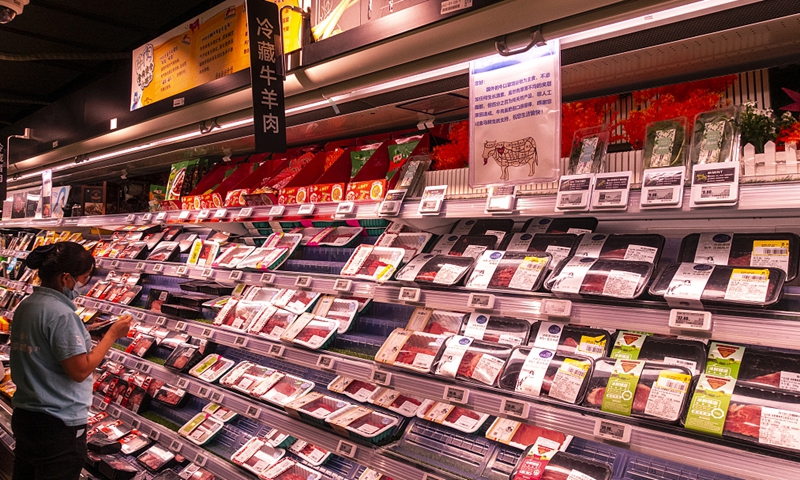
Imported beef is sold in a supermarket in Shanghai. Photo: VCG
China has beefed up efforts on the diversification of beef imports in 2024, with more exporters in countries such as Australia and Russia having been approved to sell beef to China. Chinese observers said the move will help reduce market fluctuations due to over-reliance on any single market, while providing more opportunities for other countries through high-level opening-up.
The General Administration of Customs (GAC) recently made several announcements about beef imports, expanding the list of beef products that can be imported from Russia while lifting bans on some German beef imports.
Moreover, a number of Australian media outlets have reported that five more major Australian beef exporters have been granted permits to resume exports to China, citing Australian Agriculture Minister Murray Watt.
"Compared with beef imported from the US, Australian beef has advantages in tariffs and prices, and as a result, is more popular in the China market," a manager with Aochen (Shanghai) Food Technology Co told the Global Times on Tuesday.
The manager said that the company's imports of Australian beef have been stable despite the halt of some Australian beef exporters' licenses previously. Russian beef also has price advantages at the moment.
Due to international grain trade uncertainties amid rising geopolitical tensions and trade protectionism, China has deepened food cooperation with other countries so as to diversify imports of agricultural products to ensure import stability.
China mainly imports beef from countries including Brazil, Argentina and Uruguay.
Along with China's economic recovery, its beef imports continue to rise. According to data released by the GAC, China imported 1 million tons of beef in the first four months of 2024, up 22 percent year-on-year.
In 2023, the country purchased a total of 2.74 million tons of beef, up 1.8 percent year-on-year, hitting a new high.
There is a growing demand for high-quality agricultural products and food as incomes rise on China's market, Li Guoxiang, a research fellow at the Rural Development Institute of the Chinese Academy of Social Sciences, told the Global Times on Tuesday.
The country is actively building a diversified food supply system, including promoting the diversification of beef imports to meet this consumption trend, Li said.
Li said that the selection of origins for beef imports is market-driven, based on factors such as quality, price and domestic demand. However, he added that "bilateral relations between China and exporting countries can also influence decisions, leading importers to opt for stable and reliable sources to reduce risks.
"In recent years, while the US has abandoned multilateral global trade rules, China has been committed to high-level opening-up to the world, expanding cooperation with developing countries to foster diversification in global trade, and establishing mutually beneficial economic ties," Li said.
China has been optimizing its selection of imported agricultural products, based on the domestic market's preference for high-quality goods, Ma Wenfeng, a senior analyst at the Beijing Orient Agribusiness Consultancy, told the Global Times on Tuesday.
"The decision to prioritize goods from regions other than the US is a rational market-oriented action," Ma said.
China's increase in agricultural imports from resource-rich developing countries aligns with market development trends, international trade rules and the principle of maximizing global economic interests, Ma noted.
On the basis of ensuring food security, China's grain and meat imports inject lasting momentum into global grain security and free trade, and they contribute to the recovery of the sluggish world economy, according to analysts.
They said that China should make better use of both domestic and international markets and strengthen investment in the whole industrial chain including grain production, storage and logistics, as well as processing and procurement, in a bid to ensure the safety, stability and sustainability of international supply chains and enhance the country's pricing power in the international trade of agricultural products.
中国在2024年加大了牛肉进口多元化的努力,澳大利亚和俄罗斯等国的更多出口商已获准向中国出售牛肉。中国观察人士表示,此举将有助于减少因过度依赖单一市场而导致的市场波动,同时通过高水平开放为其他国家提供更多机会。
海关总署(GAC)最近发布了几项关于牛肉进口的公告,扩大了可以从俄罗斯进口的牛肉产品清单,同时取消了对部分德国牛肉进口的禁令。
此外,多家澳大利亚媒体援引澳大利亚农业部长默里·瓦特(Murray Watt)的话报道称,又有五家澳大利亚主要牛肉出口商已获准恢复对中国的出口。
“与从美国进口的牛肉相比,澳大利亚牛肉在关税和价格方面具有优势,因此在中国市场更受欢迎,”奥辰(上海)食品科技有限公司的一位经理周二告诉《环球时报》。
该经理表示,尽管此前一些澳大利亚牛肉出口商的许可证被暂停,但该公司的澳大利亚牛肉进口一直保持稳定。俄罗斯牛肉目前也有价格优势。
由于地缘政治紧张局势加剧和贸易保护主义加剧,国际粮食贸易存在不确定性,中国深化与其他国家的粮食合作,实现农产品进口多样化,确保进口稳定。
中国主要从巴西、阿根廷和乌拉圭等国家进口牛肉。
随着中国经济的复苏,其牛肉进口量持续增加。根据海关总署公布的数据,2024年前四个月,中国进口牛肉100万吨,同比增长22%。
2023年,全国牛肉采购总量274万吨,同比增长1.8%,再创新高。
中国社会科学院农村发展研究所研究员李国祥周二告诉《环球时报》,随着中国市场收入的增加,对优质农产品和食品的需求不断增长。
李说,中国正在积极构建多元化的食品供应体系,包括推动牛肉进口多样化,以满足这一消费趋势。
李说,牛肉进口的原产地选择是市场驱动的,基于质量、价格和内需等因素。然而,他补充说,“中国与出口国之间的双边关系也会影响决策,导致进口商选择稳定可靠的来源以降低风险。
“近年来,虽然美国放弃了多边全球贸易规则,但中国一直致力于对世界高水平开放,扩大与发展中国家的合作,促进全球贸易多样化,建立互利的经济关系,”李说。
北京东方农业综合企业咨询公司高级分析师马文峰告诉《环球时报》,中国一直在根据国内市场对优质商品的偏好,优化进口农产品的选择在星期二。
“优先考虑来自美国以外地区的商品的决定是一种理性的市场导向行动,”马说。
马指出,中国从资源丰富的发展中国家进口农产品的增加符合市场发展趋势、国际贸易规则和全球经济利益最大化的原则。
分析人士表示,在保障粮食安全的基础上,中国粮食和肉类进口为全球粮食安全和自由贸易注入持久动力,有助于低迷的世界经济复苏。
他们表示,中国应更好地利用国内和国际市场,加强对粮食生产、仓储物流、加工采购等全产业链的投入,确保国际供应链的安全、稳定和可持续性,增强国家在农产品国际贸易中的定价能力。













